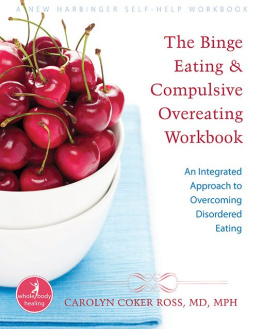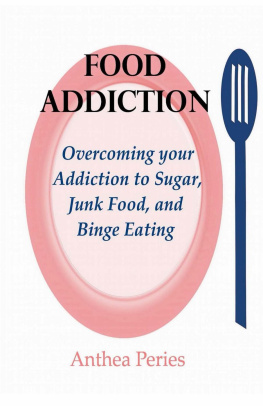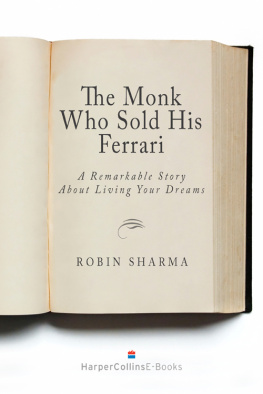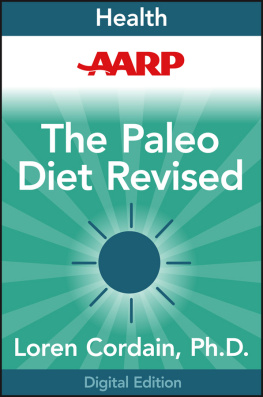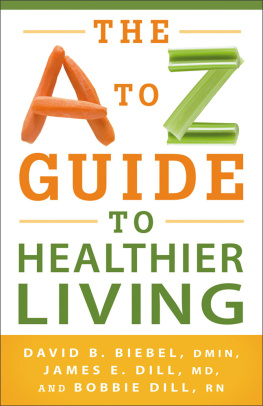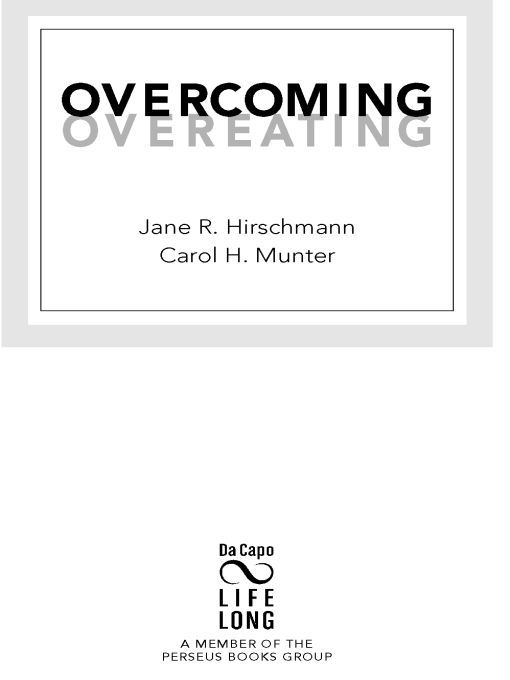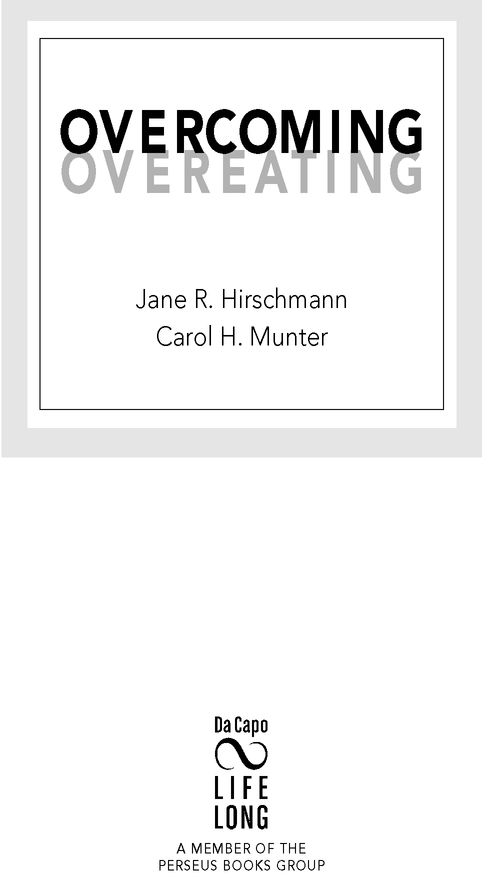Table of Contents
Praise for Overcoming Overeating From Experts and Former Overeaters
It gives the reader all the inspiration they need to stop dieting and begin living a rich, full, self-accepting life.
GENEEN ROTH
Overcoming Overeating is a thorough examination of the chronic dieters dilemma. Hirschmann and Munters methodfood on demandoffers an exciting new approach. It is a sensible and safe alternative to dieting.
WILLIAM B. BATEMAN, JR., M.D.
Albert Einstein College of Medicine
Thank you so much for this book! I really feel that it changed my life and my obsession with food. It was amazingas soon as I stopped dieting, I stopped spending so much time worrying about food. I now have more time to do other things I enjoy, and find I have more energy to do them.
J.B., Pleasanton, CA
A refreshing, upbeat approach to eating and living. Hirschmann and Munter use their considerable expertise and insight to provide a wealth of practical advice about how to stay off the diet treadmill.
DR. JANET POLIVY and DR. PETER HERMANN,
Authors of Breaking the Diet Habit
The therapy has forever changed the way I think about food and my bodyit has freed me from my eating obsession. I no longer use food for anything but its natural purpose, to satiate my physical hunger.
M.H., New York, NY
NOTE: The information in this book is true and complete to the best of our knowledge. This book is intended only as an informative guide for those wishing to know more about health issues. In no way is this book intended to replace, countermand, or conflict with the advice given to you by your own physician. The ultimate decision concerning care should be made between you and your doctor. We strongly recommend you follow his or her advice. Information in this book is general and is offered with no guarantees on the part of the authors of Da Capo Press.
In memory of Murry Weiss
C.H.M.
To Edith Schwartz
J.R.H.
To all those whove had the courage to challenge the status quo in order to make significant changes. And with the hope that many more will do the same.
Acknowledgments
Our deepest appreciation to Karen Levine, whose skill, patient guidance, humor, and friendship made the writing of this book both possible and pleasurable.
Our heartfelt thanks to Richard A. Levy and Bert Wainer for their thoughtful attention to the manuscript and for their loving support.
Our gratitude to several others who read the manuscript and offered helpful commentsFrances Wells Burck, Alan Gelb, Jan Goodman, Laura Kleinerman, Carol Mager, Michelle Neumann, John Reilly, Judith R. Smith, Dr. Lucille Spira, Joan Stein, and to Linda Nagel for her research assistance.
Special thanks to our agent, Ellen Levine, for her skill, her support, and her tenacity, and to our editor, William Patrick, for his insistence that this book become the best it could be.
We would also like to acknowledge Martin S. Bergmann, Ernst and Gertrud Hirschmann, Janice La Rouche, Dr. Ruth Lax, Naomi Munter and the late Harold Munter, and Anne-marie Rosenthal, from whom we have received so much. Our thanks also to Susan Gillespie, who kept home and hearth going, and to the childrenKate, Nell, Leta, Noah, and Nathanielfor their many welcome (and sometimes not so welcome) interruptions in our workdays.
Foreword
Despite the entrenchment of the diet mentality in our culture, the past decade has seen the beginnings of yet another revolution in thinking about eating, weight, and dieting. In Overcoming Overeating, Jane Hirschmann and Carol Munter present the outline of a program derived from their extensive clinical experience. This program, happily, corresponds in many ways to the sorts of conclusions that basic researchers like us have drawn about the problem of overeating and how to overcome it.
How is this book revolutionary? Readers will be pardoned for being a little cynical at this point since they have read so many other books, each based on a revolutionary premise, promising to help them cope with their weight and eating problem. Each of these diet books claims to be revolutionary in the sense that it presents a painless, easy shortcut to weight loss, taking advantage of some secret principle of nutrition or pattern of eating that allows dieters to overcome the obstacles that have sabotaged all their previous diet efforts. Although these secret principles vary from fad to fad, what remains the same are the basic premises: you have to find a way of achieving negative energy balance, that is, expending more calories than you take in, in order to lose weight.
The secret principles of successful dieting are not revolutionary; at best, they are seemingly clever tactics that we may employ, invariably without success, in our rebellion against our own weight and eating habits. Overcoming Overeating is revolutionary because it challenges the very premises, rather than the tactics, of the struggle.
Hirschmann and Munter start with the implicit premise that the problem is overeating, not being overweight. This is a significant departure from previous thinking in a couple of respects. First, it implies that we identify our problem behaviorally, not in terms of our appearance. What disturbs Hirschmann and Munter, and their patients, is the compulsive eating in which so many of us engage despite our best intentions. Hirschmann and Munter focus on our obsession with food, our dissatisfaction with our eating habitswe are dissatisfied when we eat and dissatisfied when we dont eatour guilt, and our sense of being out of control. Their goal is to make us feel better about ourselves, to free us from our compulsive-eating patterns, to achieve some harmony with our bodiesand not simply to lose weight, no matter what it takes.
The second implication in the phrase overcoming overeating is that we should not be concerned with devising a plan to ensure successful undereating (or a negative energy balance). Rather, if we can eliminate overeatingeating in excess of our bodies natural requirementswe will have solved the problem. The problem is not being overweight but overeating.
But what about being overweight? This problem may be addressed in a number of ways. For one thing, most dieters are not significantly overweight. Dieting has become so much a part of our culture that women do it regardless of their actual weight, on the assumption that no matter what they weigh, it would be better to weigh less. Second, the evidence points more and more to the conclusion that the alleged health risks of being overweight are as much a matter of rapid weight change as it is of the weight itself. Rapid weight loss is a health hazard, but so is rapid weight gain, and the dangers of becoming overweight, according to health researchers, are not as clear as they once were. Finally, and most importantly, dieting actually causes overeating. This is the truly revolutionary premise that has emerged in the research literature in the past decade. Clinicians such as Hirschmann and Munter have simultaneously reached the same conclusion on the basis of their exposure to eating-disordered clients. The compulsive eating that plagues their clients is eating that is out of sync with the bodys natural needs; it is eating for all the wrong reasons. And how does such compulsive eatingmore often than not compulsive overeating that produces the dreaded positive energy balancearise? Almost invariably, it is the result of dieting.


